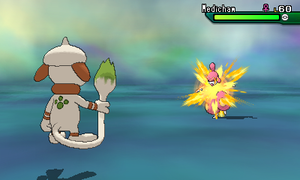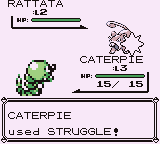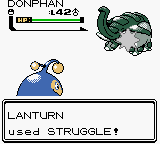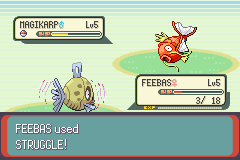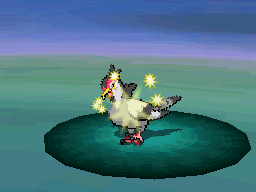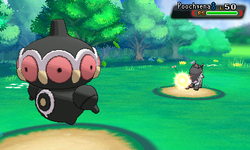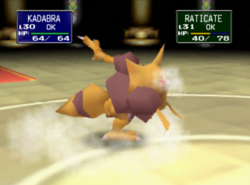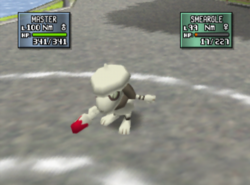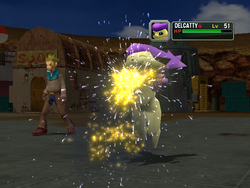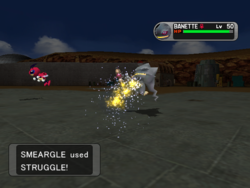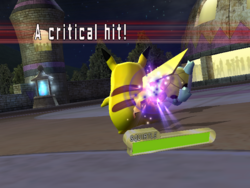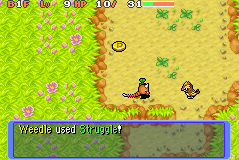Struggle (move)
| Struggle わるあがき Vain Struggle | ||||||||||||
| ||||||||||||
Range
| ||||||||||||
Availability
| ||||||||||||
| ||||||||||||
| ||||||||||||
| ||||||||||||
Struggle (Japanese: わるあがき Vain Struggle) is a damage-dealing move introduced in Generation I. It is a move that every Pokémon can use when none of its moves are usable, although no Pokémon can naturally learn it. Prior to Generation II, it dealt Normal-type damage.
Effect
Generation I
Struggle deals damage to the opponent and the user receives recoil damage equal to ½ of the damage the attack did to the opponent. Struggle will automatically be used by a Pokémon that has no usable moves but is ordered to attack, and is not affected by any PP limitations. Struggle is capable of striking a critical hit.
Struggle has an accuracy of 100%.
If the user of Struggle attacks first and knocks itself out due to recoil damage, the opponent will not attack or be subjected to recurrent damage during that round. If Struggle breaks a substitute, the user will take no recoil damage.
Struggle has 10 base PP, though no PP would ever be deducted from it. Self-inflicted recoil damage from Struggle from the previous turn can be countered if the opponent did not make a move on the following turn.
Struggle deals Normal-type damage in this Generation, meaning it is not very effective against Rock-type Pokémon and ineffective against Ghost-type Pokémon. If the only usable move is disabled by Disable, the affected Pokémon will use Struggle.
In Stadium, no recoil damage is taken if Struggle knocks out an opponent.
Generations II and III
Struggle now has a maximum of 1 PP instead of 10 (16 with PP Ups), and its recoil damage is equal to ¼ of the damage the attack did to the opponent. Although still classified as a Normal-type move, Struggle is now unaffected by types, inflicting neutral damage to Steel-, Rock-, and Ghost-type Pokémon and being unaffected by STAB. Struggle can hit through Wonder Guard. Its target is a randomly selected opponent in Double Battles.
The user will take recoil damage even if Struggle breaks a substitute, or if its Ability is Rock Head or Magic Guard.
If a Pokémon holding a Choice Band is affected by Disable, Taunt or Imprison such that it cannot use the move that the Choice Band forces it to, it will not be able to use a move other than Struggle as long as the item and effect both remain active. If a Pokémon is holding a Choice Band and is affected by Torment, the Pokémon will use Struggle every second turn.
Generation IV onward
The user now takes ¼ of its maximum HP as recoil damage, regardless of how much damage the attack did to the opponent. A user with only 1 HP will knock itself out with recoil damage.
If a Pokémon holding a Choice item is affected by Disable (including due to the effect of Cursed Body), Taunt or Imprison such that it cannot use the move that the Choice item forces it to, it will not be able to use a move other than Struggle as long as the item and effect both remain active. If a Pokémon holding a Choice item is affected by Torment, it will not be able to use a move other than Struggle every second turn.
Struggle now bypasses accuracy checks to always hit, unless the target is in the semi-invulnerable turn of a move such as Dig or Fly.
Despite being considered a recoil move, Struggle will not gain a boost by Reckless.
Struggle can no longer be copied by Mirror Move.
Struggle is unaffected by a held Normal Gem (and will not consume it).
Description
|
Learnset
No Pokémon can learn or know Struggle directly, but all Pokémon can use Struggle when they cannot use any other moves, such as by them all having 0 PP, or if they are all incapacitated through any of Disable, Taunt, Torment, Imprison, Heal Block, Cursed Body, Assault Vest, or Choice items. Also, some moves, such as Belch, cannot be selected unless specific conditions are met, so can also cause the Pokémon to Struggle if they are the only moves with PP.
In the Mystery Dungeon series, the only way to use Struggle is to use a move when none of the Pokémon's moves are usable for one or another reason (like running out of PP). The move deals 1/4 of the total HP of that Pokémon.
In other games
Pokémon Mystery Dungeon series
Struggle will be used when the Pokémon runs out of PP for its moves and the Pokémon attempts to use one of its moves. It results in recoil damage of 25% of its max HP in all games, except in Gates to Infinity where it deals 20% recoil damage of its max HP.
Pokémon GO
- Prior to an update to Niantic's servers on February 16, 2017, Struggle had a power of 15, an energy bar of
 , and a duration of 1.695 seconds.
, and a duration of 1.695 seconds.
Description
|
In other generations
Core series games
Spin-off series games
Trivia
- Even though Struggle can only be accessed by the loss of all PP, it was given Contest, Super Contest, and Contest Spectacular stats. This is most likely to prevent the game from crashing if a Pokémon is hacked to have Struggle as one of their four moves.
- Struggle is the last non-glitch move in index number order in Generation I, and the last Generation I move in index number lists since then.
- Along with Chatter and Sketch, Struggle is one of three non-Shadow moves that cannot be copied by Sketch in any generation.
- In Generation I, Struggle was the only move that could not be called via Metronome, besides Metronome itself.
- Struggle has the lowest base power of all recoil-causing moves.
- Because it deals typeless damage, Struggle is the only damaging Normal-type move which can hit a Ghost-type opponent without the aid of Odor Sleuth, Foresight, a Ring Target, or Scrappy.
- Along with Barrage and Kinesis, Struggle is one of three moves introduced in Generation I that have not been featured in the main anime series.
- It is also one of two Generation I moves that have not been used in the Pokémon Adventures manga, the other being Kinesis.
- Certain glitch Pokémon, including Generation IV hybrids, 'Ng'Mp, 'ゥ., and 4, ゥァ (DD), can learn Struggle by level up.
- Should a player hack Struggle onto a Pokémon, it will not be displayed correctly in Pokémon Stadium 2's lab (not the case for the previous game) and will be highlighted, as if it was a Generation II move. This does not happen when selecting a team for battle.
- In Pokémon Stadium, the move description erroneously states that Struggle inflicts recoil to the user equal to ¼ of the damage inflicted; the correct number prior to Generation II is ½.
- In Generation I, a glitch can occur making it impossible for a Pokémon to use Struggle if it has previously used Transform followed by either Metronome or Mirror Move. This renders the Pokémon completely unable to battle until its PP is restored.[1]
In other languages
| ||||||||||||||||||||||||||||||||||||||

|
This article is part of Project Moves and Abilities, a Bulbapedia project that aims to write comprehensive articles on two related aspects of the Pokémon games. |
